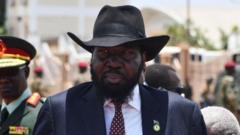In a reaction to the recent US visa ban affecting all South Sudanese citizens, the country's government insists it resulted from an incident involving a man mistakenly identified as being from South Sudan instead of the Democratic Republic of Congo.
South Sudan Responds to US Visa Ban, Claims Mistaken Identity Behind Controversy

South Sudan Responds to US Visa Ban, Claims Mistaken Identity Behind Controversy
The South Sudanese government rebuts the US visa ban, asserting that it stems from a wrongful nationality designation of a deported individual.
South Sudan has sharply criticized the United States for imposing a visa ban on all its nationals, attributing the measure to an incident involving an individual who, officials contend, is not a citizen of the country. The US Secretary of State, Marco Rubio, announced the ban earlier this week, citing South Sudan's lack of cooperation in accepting the return of its citizens deported from the US. However, South Sudan's foreign ministry argues that the individual in question was a citizen of the Democratic Republic of Congo who was denied entry and subsequently returned to the US for further processing.
"This blanket ban based on an isolated incident involving misrepresentation by someone who is not a South Sudanese national is regrettable," stated the foreign ministry of South Sudan. As Rubio noted, the US also plans to prevent any South Sudanese citizens from entering the country until South Sudan shows full cooperation regarding repatriation.
The veil of controversy surrounds this unprecedented punitive measure, as it marks the first time the US has targeted all passport holders from a specific nation since the return of Donald Trump to the presidency, promoting an anti-immigration agenda. South Sudan’s Information Minister, Michael Makuei Lueth, expressed his discontent, suggesting the US is searching for faults in the nation's already tense state, emphasizing that no sovereign country would willingly accept foreign deportees.
Tensions within South Sudan have been escalating, further compounded by the house arrest of First Vice-President Riek Machar, accused by President Salva Kiir of igniting potential revolt. The precarious situation has prompted the US to order non-emergency staff to evacuate, amid fears that South Sudan could be on the brink of a return to civil conflict, undermining the fragile peace deal established in 2018. The Temporary Protected Status previously granted to South Sudanese in the US was set to expire on May 3, amplifying concerns for those citizens currently living abroad.
"This blanket ban based on an isolated incident involving misrepresentation by someone who is not a South Sudanese national is regrettable," stated the foreign ministry of South Sudan. As Rubio noted, the US also plans to prevent any South Sudanese citizens from entering the country until South Sudan shows full cooperation regarding repatriation.
The veil of controversy surrounds this unprecedented punitive measure, as it marks the first time the US has targeted all passport holders from a specific nation since the return of Donald Trump to the presidency, promoting an anti-immigration agenda. South Sudan’s Information Minister, Michael Makuei Lueth, expressed his discontent, suggesting the US is searching for faults in the nation's already tense state, emphasizing that no sovereign country would willingly accept foreign deportees.
Tensions within South Sudan have been escalating, further compounded by the house arrest of First Vice-President Riek Machar, accused by President Salva Kiir of igniting potential revolt. The precarious situation has prompted the US to order non-emergency staff to evacuate, amid fears that South Sudan could be on the brink of a return to civil conflict, undermining the fragile peace deal established in 2018. The Temporary Protected Status previously granted to South Sudanese in the US was set to expire on May 3, amplifying concerns for those citizens currently living abroad.




















